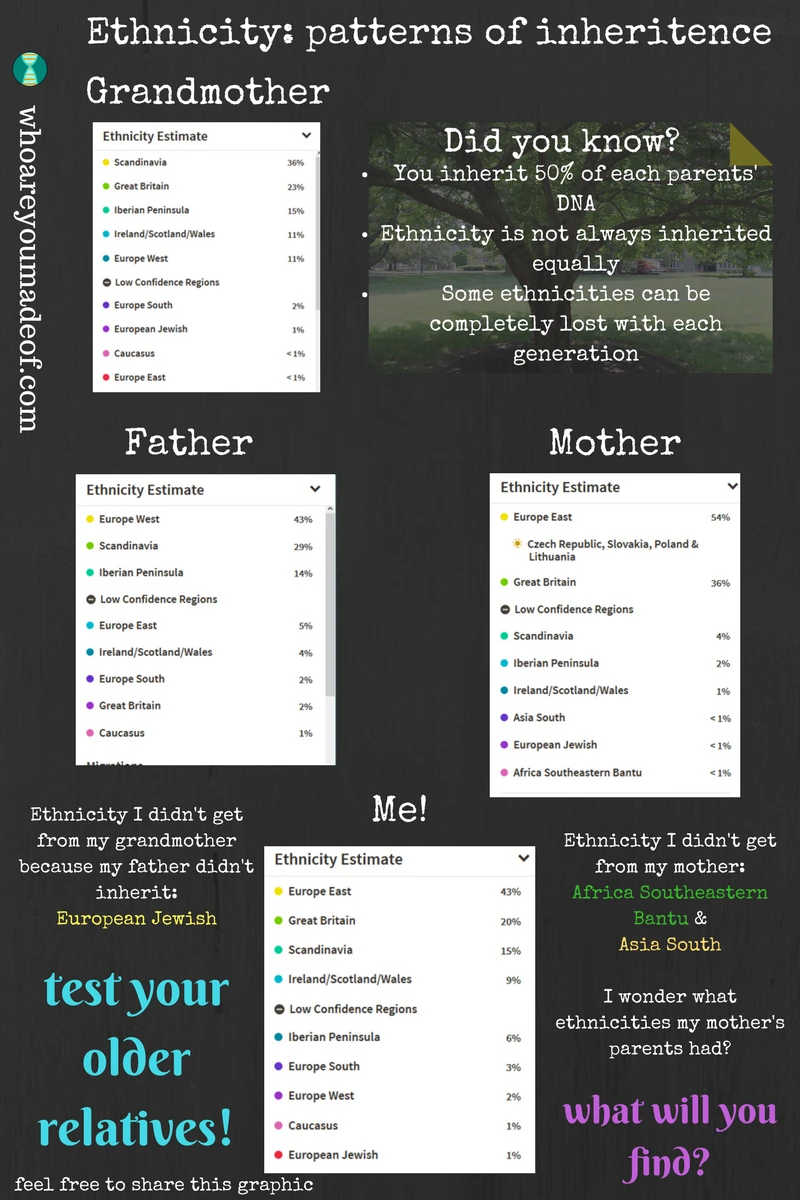Why don't I have an ethnicity that my parent has? Ethnicity estimates are the cause of much discussion, as you may know. Many people want to know why they didn't inherit all of the ethnicity regions that their parents have.
In this post, you'll learn why this happens and see a real world example.
In my own family, both of my parents have ethnicity regions that I don't have, and my grandmother has regions that my dad doesn't have. My grandmother had European Jewish that my dad didn't get, and my mom has Asia South and Southeastern Bantu that I didn't inherit.
Does this mean that ethnicity estimates are inaccurate?
Absolutely not! While it's true that ethnicity estimates should only be used a general guide to our more serious genetic genealogy research, the discrepancies between parent/child comparison don't mean that the results are faulty.
In fact, the differences in the tests actually demonstrate an important aspect of how DNA is inherited - i.e science!
How can a child not have an ethnicity that a parent has?
The answer is actually quite simple. When you were conceived, you inherited 50% of your DNA from your dad, and 50% of your DNA from your mom.
This means that there is 50% of both your mother and father's DNA that you didn't inherit.
For example, if you notice that your mother had 10% Native American DNA, but none showed up on your own results, the most likely scenario is that your mothers Native American DNA ethnicity was contained within that 50% of her DNA that you didn't inherit.
This is actually the most common reason that we don't see an ethnicity in our DNA results that we were expecting to find. For example, if I know that my great-grandfather was Italian, and I don't see any Italian in my results, I might be inclined to say that my test results are inaccurate.
In reality, my great-grandfather was probably not 100% Italian, since Italians tend to have at least some DNA from neighboring regions. This means that his children would have inherited less than 50% Italian DNA, and his grandchildren less than 25%.
In this scenario, if my mother only had 25% or less Italian DNA, there is a good chance that the randomly selected 50% of my DNA that I inherit from her would contain no Italian DNA, or only a small amount.
Note: I don't actually have any Italian great-grandparents, I just used it as an example. There has to be some other explanation for my obsession with Italian food!
How common is it for a child to not inherit an ethnicity of a parent?
It is very common for a child to not inherit an ethnicity from a parent, especially when the parent only has a very small amount of the particular ethnicity region in their DNA. It's basically a numbers game:
- The more of an ethnicity that the parent has, the higher the chance that the child will inherit at least some of that ethnicity
- The less of an ethnicity that a parent has, the smaller the chance that the child will inherit the ethnicity
My mom is about 60% Eastern European. If we imagine that there is a jar full of 100 marbles, 60 of them being red (Eastern European) and 40 of them being blue (all of her other ethnicity regions), you can visualize the probability that I "randomly" inherited a good amount of Eastern European from her.
If I reached into the jar with my eyes closed and pulled out 50 marbles one-by-one, and then opened my eyes to see which colors I had chosen once I was done, you can imagine that many of my marbles would be red.
In fact, there is a good chance that about half of my marbles would be red.
In my example, the most the most common number that I would randomly choose would be 30, but it is unlikely that I would really pick 30.
According to my sister, who is a "Math Doctor", who I had to consult for this question (math is not my strongest subject), she says that more realistically there would be a range of how many of the red marbles that I would likely pick.
This is interesting to note, since when two full siblings do a DNA test, there will almost always be a difference in the amount of any given ethnicity inherited from both parents - probability at work!
This is why we don't usually inherit 50% of all of our parents' ethnicities, and sometimes don't inherit any at all.
What if my mom only had a small amount of an ethnicity? My mom has about 1% Southeastern Bantu.
Using our same example, if I have a jar of 99 red marbles (all of her other ethnicities) and one blue marble (the 1% Southeastern Bantu), the odds that if I, blindfolded, select that one blue marble surrounded by 99 red marbles equal to the odds that I don't, even if I am choosing 50 marbles in total.
In other words, the chance that I inherit the 1% Southeastern Bantu is about 50%, and the odds that I don't inherit it are 50%, too.
Real life example of how children don't inherit all of their parents' ethnicities
In the graphic below, you can see an example of how two children (my father and myself) did not inherit ethnicity from their parents. There is one ethnicity that my dad didn't inherit from his mom, and there are two ethnicities that my mom has that I didn't get.

Conclusion
I hope that you have learned a little bit about why either of your parents have an ethnicity that you don't have. I bet now you can imagine how an ethnicity can completely disappear after only a few generations.
If you have any questions, comments, or concerns, or just want to share your experience, I would love to hear from you below.
Thank you so much for stopping by!


Barbara Gosss
Monday 18th of September 2023
My paternal grandfather came to US in 1913 from Poland, his wife, my grandmother, also came to America from Poland.
My mother's family was 100% from England.
Only mom's English side shows up at 30% and Italian is 50%, yet I don't have any Italians in my tree... but I love Italian food.